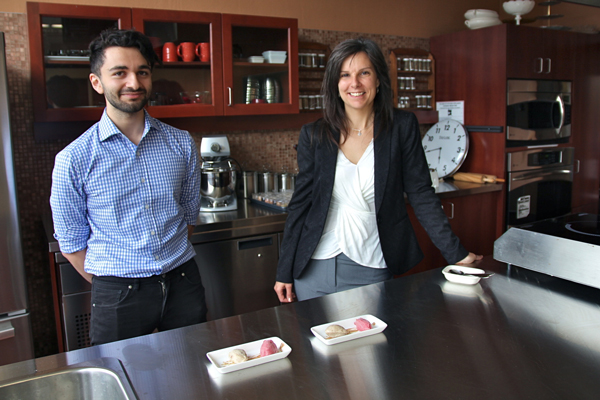
By McGill Reporter Staff
A sorbet-like dessert developed by a team of 16 Food Science and Agricultural Chemistry students, has finished third in the prestigious Institute of Food Technologist Students’ Association, annual Food Product Development Competition sponsored by MARS. The announcement was made on June 23, in New Orleans where the competition was being held as part of the Institute of Food Technologists Annual Meeting, a major event that drew more than 20,000 food professionals from around the globe, including people working in R&D, and product development.
First place went to Cornell University with University of Wisconsin finishing second.
It’s the first time in over twenty-five years that a Canadian team has been selected to even participate in the finals, so placing in the Top 3 was especially exciting for the team. “We are really proud of our product,” says Karine Paradis, team leader who graduated with a BSc(F.Sc)/BSc(Nutr.Sc) in an interview with the Reporter leading up to the competition. “We’ve been working day and night on this project since September, as well as keeping up with our regular class loads, so to see it reach this point is really rewarding.”
Remarkably, considering its strong result, McGill’s shelf-stable frozen dessert came from humble beginnings as a project for the undergraduate Food Product Development course led by Professor Salwa Karboune.
The dessert’s most innovative quality is that is can be stored at room temperature in its original liquid form. This means no drippy containers at the end of a hot summer day of grocery shopping and, because it can sit on a shelf, it will reduce the clutter clogging so many people’s freezers.
When one is struck by a craving for either flavour – hibiscus and ginger or almond and pistachio – all they do is pop and replace the lid to let a little air in, give a little shake and put it in the freezer. A few hours later, they’ll be enjoying a melt-in-your-mouth delight that is as good – or better – than the standard frozen fare found at your local grocery store.
While product development and preparation was demanding for the team, the competition itself was equally gruelling. The process began with an oral presentation, followed by a poster session where the panel of judges asked some tough questions about the science behind the product. The final step was the taste test, which the McGill entry passed with flying colours.
“I am extremely proud of our McGill team,” said Prof. Karboune. “I was pleased to see their dedication, their immense energy, their genuine commitment and their bright eyes.”
The strong result doesn’t guarantee product development, but it could lead to something big. As Paradis noted “This product should be very interesting for some of the major players in the market because we have a frozen product that doesn’t need any refrigeration equipment – which is where the vast majority of energy is expended by companies making frozen foods,” she said. “We hope that someone at the conference wants to invest our product.”
For more details on McGill’s shelf-stable frozen dessert, go here.
